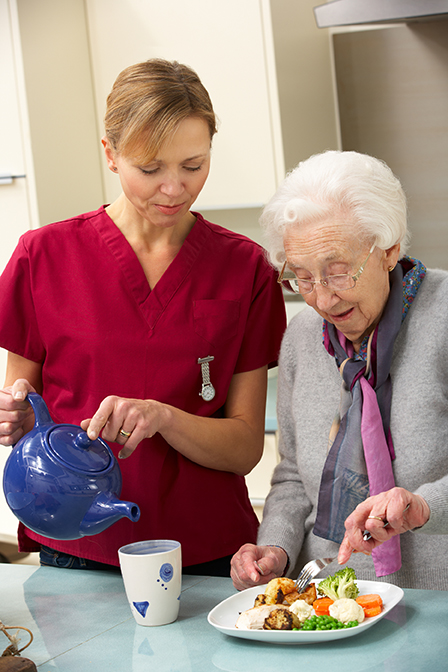Do you have a few residents who love to visit your therapy gym long after they were discharged from skilled services? Did you ever wonder why they try to engage in the energy and conversations which flow in your space? As we age, many older adults become increasingly isolated. Sometimes an older adult lacks a network of family and friends; other times he or she may withdraw into isolation because of health conditions, depression, or mental illness. Physical limitations such as a fear of falling can keep an older adult isolated, as can fatigue, chronic pain, or embarrassment over memory problems.
Loneliness Harms the Brain
Interesting new research is showing that loneliness may speed the onset of dementia. In a recent Dutch study published in the Journal of Neurology, Neurosurgery, and Psychiatry, researchers followed more than 2,000 healthy, dementia-free older adults for three years and found that 13 percent who reported feeling lonely developed dementia by the end of that time, as compared with 6 percent with strong social support.
Loneliness Harms The Heart
In 2012, the Journal of the American Medical Association (JAMA) compiled the results of numerous studies and concluded that there’s a link between loneliness and fatal heart disease. In one study cited, researchers at Harvard followed 44,000 people with heart disease and found that 8 percent of patients who lived alone died after four years, compared with 5.7 of those who lived with a spouse or others.
In research on the outcomes of coronary disease, Swedish researchers discovered that coronary bypass patients who checked the box “I feel lonely” had a mortality rate 2.5 times higher than other patients 30 days post-surgery, and that even five years later they were twice as likely to have died.
Loneliness Kills
When researchers at the University of California, San Francisco, followed a group of older adults for six years, they found that by the end of the study period, almost a quarter (22.8 percent) of all those who had reported feeling isolated or lonely had died. And another 25 percent had suffered significant health declines. By comparison, among those who said they were happy or satisfied with their social lives, only 12.5 percent had declining health, and only 14.2 percent had died.
And before you dismiss this type of isolation as common only among the very old, consider that the average age of the adults in the study was just 71. In other words, many baby boomers are reaching retirement age without strong social networks to support them. Another study, this time from Brigham Young University, analyzed study data for more than 300,000 people and found that loneliness was as strong a marker for early death as alcoholism and heavy (more than 15 cigarettes a day) smoking.
4 Ways to Protect Older Ones from Loneliness
What can you do if an older adult in your life is growing isolated or lonely? Here are four simple steps you can take to help your loved one reconnect:
- Help your loved one become more social-media savvy. As younger folks know all too well, you don’t need to leave your house to catch up with friends, follow current events and find out about events in your area. Email and news sites are one way to do this, of course, but using a social media site like Facebook makes it even easier for an older adult to feel connected, simply by being able to see what others are posting. Can this be incorporated into your skilled therapy sessions? Would this be an appropriate functional maintenance program which could be implemented by your activities team?
- Encourage socialization and meeting neighbors. If they have moved into a new environment, they may feel socially isolated. Their generation was raised on social norms more formal in nature. Meeting new people was often as result of an introduction from another person. While we may be comfortable going up to a stranger and saying “hello, my name is Beth, it is great to meet you”, our older clients may shy away from such directness. Do you have the opportunity for encourage socialization as a part of the therapy process? Do you help to orient new residents to their home … how to navigate the building, where to find the activity schedule, best spots outside to watch nature, etc. Maybe it is suggesting a “buddy system” to help the transition with an assigned neighbor.
A Dutch study published in the Journal of Neurology, Neurosurgery, and Psychiatry showed that people who lived alone or who were no longer married were between 70 and 80 percent more likely to develop dementia than those who lived with others or were married. And a recent study conducted at University College London found that social isolation — even more than loneliness — can lead to early death, even for those as young as 52. Does this sound like your community?
- Explore their interests, hobbies and routines. As we create a care plan, do we have the opportunity to customize our therapeutic approaches to optimize their engagement? Being creative is part of the unique nature of physical, occupational and speech therapy. As we transition the resident to functional maintenance, are we sharing the unique needs of the resident to allow activities to meet their needs? Can we serve as a consultant to open the diversity of programs available on your campus? Just ask one of our clinicians who brings their dog to work a few times each week…yes, residents love it! Does your facility have a pet therapy program? Maybe we can be the lead for thinking outside of the box.
- Help find support groups. When older adults with health problems find support from others with the same condition, it helps with loneliness and depression. They may also get valuable information and motivation to seek help for their health condition. University College London researchers noted that the early death rate for socially isolated people may be because they don’t have anyone to encourage them to get help with health problems or to intervene in a health crisis. An online support group may ease anxiety and inspire ideas for ways to help themselves. If your resident is a widower or widow, a bereavement or grief support group offers a chance to share feelings as well as a place to meet others in the same situation.


Comments (0)